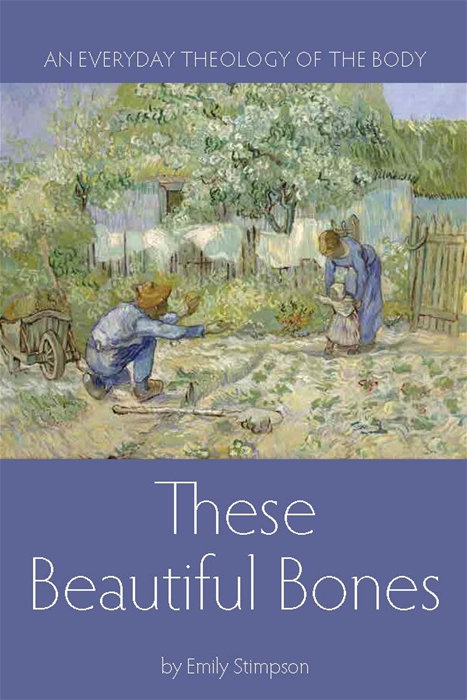
Merridith Frediani reviews Emily Stimpson's logical, approachable book on Theology of the Body.
In a series of more than 130 Wednesday audiences, Pope John Paul II introduced to the world the Theology of the Body. The world needed the introduction. While we may not have grasped the importance of what he was saying as the audiences unfolded, as time passed the beauty and the radicalness of his message has become more important than ever.
American culture today sees the human body as merely matter; something to be used. JPII saw the body as part of a union - a union of body and soul. Our bodies are the physical representation of us. “The way John Paul explains it is this: The body ‘expresses the person.’ It ‘reveals the living soul,’ making visible the invisible. The body is how the world sees us and knows us.” (These Beautiful Bones, Emily Stimpson)
Our bodies are not blobs of cells or suitcases for our souls. They are how we communicate our feelings and thoughts through our use of words, actions, and facial expressions. My body is how the I of my soul is related to the world. Without my body I couldn’t laugh with my friends, smile at my husband, or hold my daughter’s hand.
These Beautiful Bones: An Everyday Theology of the Body by Emily Stimpson is a lyrical, sometimes poetic, always thoughtful exposition of how the Theology of the Body laid out by John Paul II went beyond the sexual realm and into the everyday. She opens with the sacramental worldview which acknowledges that all was created by God and everything “proclaims some truth about it’s Maker.” The sacramental worldview is where “heaven comes to earth, grace penetrates matter, and every individual’s story is part of the cosmic story of salvation history.” (Told you it’s poetic.) We see this worldview in soaring churches such as Sagrada Familia in Barcelona, in moving concertos, in the great stories of Shakespeare and Tolkien, and in the works of art by Caravaggio. We see the divine touching the human and as humans we reach for the divine.
This changed when the modern worldview came into vogue and “in denying the existence of all that wasn’t measurable, the modernists place man (as opposed to God) at the center of the universe.” We see this now in spades in our own post-modern society where the family is sacrificed for more work and more money, children are farmed out to daycare and three year old kindergarten, and gender has somehow become a choice. We see the loneliness on the faces around us. We see unprecedented rates of depression and anxiety in our teens and young adults as they navigate a culture of alcohol induced hook-ups. We live in a cancel culture where we don’t dare disagree with the dominant conversation. Our entertainment teaches us to use our bodies to get what we want and use someone else’s too if that is what it takes. Unless of course that someone else is inconvenient or unplanned, in which case we can legally dispose of that person. Our world is officially an off-the-rails free-for-all -- literally anything is okay as long as the individual pursuing it believes it is okay.
In our forward-facing culture we celebrate the breakdown of the family through high divorce rates and the demise of sacramental marriage. We deny our biology. We follow the science when it’s convenient and cancel it when it’s not. We believe we have a “right” to do whatever we please so we do it, all in the name of progress. And as we march forward on this path which will ultimately lead to our destruction, we fail to look back at the bodies left in our wake: the countless aborted babies; the anxious, depressed, and suicidal teens; the children shuffled from activity to activity but never to Church because there’s time for soccer but not for Jesus; to the college students who in their desire for community turn to alcohol, drugs, and easy sex, sacrificing their physical and emotional health for a moment of affection. If it wasn’t so tragic, it’d be laughable. I imagine the horror in heaven as our great grandparents look down and see how messed up our world is.

In dances These Beautiful Bones. This graceful book is a proverbial breath of fresh air. Starting with the demise of the sacramental worldview, Stimpson walks us through JPII’s Theology of the Body from a quotidian viewpoint talking it beyond the spousal love focus it is most often associated with.
She talks about Theology of the Body and work: “The call to work is a call built into who we are.” God’s work was the creation of the heavens and earth and man’s work is to subdue and exercise dominion over them. “When we use our whole selves, body and soul, to bring the beautiful and useful, delightful and meaningful into existence, we find joy.”
She writes about Theology of the Body and spiritual parenthood. Men are to Guard the Bride, Defend the Defenseless, Challenge Others, Do the Hard Things, Invite Other Men Alongside Them, and Lead Others to Christ. Women are called to Be Receivers, Practice Attentiveness, Cultivate Gentleness, Teach the Virtues, and Be an Advocate.
She continues with Theology of the Body and manners reminding us that we need to acknowledge those around us as gifts and honor them. We do this by responding promptly to invitations, silencing our phones and being present to those we are with, and refraining from rude gestures while driving.
She also includes chapters on dress, food, prayer, and distraction, sharing the theory of how these relate to Theology of the Body and how in the practice of integrating the lessons of Theology of the Body into these aspect of our lives, we can be more fully human, bringing honor and dignity to the Creator who made us and keeps us here through His love.
The topics inThese Beautiful Bones are approachable and logically laid out. Ms. Stimpson unsticks sticky topics and while this book is not written as a parenting guide, it is a blessing to those Catholic moms who are accepting the challenge of raising faith-filled, decent human beings. It is an antidote to the modern and postmodern worldviews that see the body as a thing. Instead it challenges us to see how we are a union of body and soul and in that union we can create beauty, further the Kingdom of God, and honor those around us.

"An antidote to the modern and postmodern worldviews that see the body as a thing." #catholicmom
Copyright 2020 Merridith Frediani
About the Author

Merridith Frediani
Merridith Frediani loves words and is delighted by good sentences. She also loves Lake Michigan, dahlias, the first sip of hot coffee in the morning, millennials, and playing Sheepshead with her husband and three kids. Merridith writes for Catholic Mom, Diocesan.com, and her local Catholic Herald. Her first book, Draw Close to Jesus: A Woman’s Guide to Adoration, is available at Our Sunday Visitor and Amazon. You can read more at MerridithFrediani.com.


.png?width=1806&height=731&name=CatholicMom_hcfm_logo1_pos_871c_2728c%20(002).png)
Comments